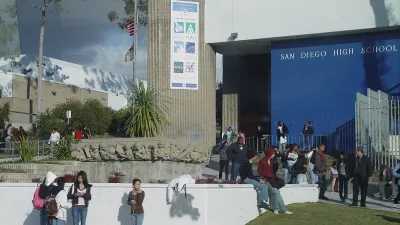The mayor of San Diego has acknowledged the ongoing crisis of housing affordability by pushing to make it easier to build housing at higher densities and with less parking. Marin County…not so much.

"[San Diego] Mayor Kevin Faulconer is unveiling on Wednesday a package of incentives to tackle San Diego’s severe shortage of affordable housing for people of low and middle incomes," reports David Garrick.
"The dozen proposals include streamlined project approvals, bonuses for densely-built projects, lower parking requirements in transit areas and loosened regulations for granny flats and business owners living in their workplace," adds Garrick.
Those and other reforms are meant to alleviate housing prices in a city where 70 percent of the residents can’t afford the $525,000 median home price. The reforms also follow on a promise made by Mayor Kevin Faulconer in his State of the City speech earlier this year.
Contrast San Diego's example with that of Marin County, which could soon be enabled to build less housing thanks to the State Legislature. A new bill, Assembly Bill 121, "lets Marin County’s largest cities and unincorporated areas maintain extra restrictions on how many homes developers can build," reports Liam Dillon. Because the bill is attached to the state budget, it hasn't had to face the scrutiny of the normal committee approval process.
Dillon notes that Marin County has the largest per capita income of any county in the state of California, but the "average renter in Marin County makes just $19.21 an hour and would need to work 77 hours a week to afford a studio apartment at the $1,915-a-month market rate, according to data from the National Low Income Housing Coalition [pdf]."
FULL STORY: Faulconer unveiling reforms to spur affordable housing construction

Alabama: Trump Terminates Settlements for Black Communities Harmed By Raw Sewage
Trump deemed the landmark civil rights agreement “illegal DEI and environmental justice policy.”

Study: Maui’s Plan to Convert Vacation Rentals to Long-Term Housing Could Cause Nearly $1 Billion Economic Loss
The plan would reduce visitor accommodation by 25% resulting in 1,900 jobs lost.

Planetizen Federal Action Tracker
A weekly monitor of how Trump’s orders and actions are impacting planners and planning in America.

Waymo Gets Permission to Map SF’s Market Street
If allowed to operate on the traffic-restricted street, Waymo’s autonomous taxis would have a leg up over ride-hailing competitors — and counter the city’s efforts to grow bike and pedestrian on the thoroughfare.

Parklet Symposium Highlights the Success of Shared Spaces
Parklets got a boost during the Covid-19 pandemic, when the concept was translated to outdoor dining programs that offered restaurants a lifeline during the shutdown.

Federal Homelessness Agency Places Entire Staff on Leave
The U.S. Interagency Council on Homelessness is the only federal agency dedicated to preventing and ending homelessness.
Urban Design for Planners 1: Software Tools
This six-course series explores essential urban design concepts using open source software and equips planners with the tools they need to participate fully in the urban design process.
Planning for Universal Design
Learn the tools for implementing Universal Design in planning regulations.
Caltrans
Smith Gee Studio
Institute for Housing and Urban Development Studies (IHS)
City of Grandview
Harvard GSD Executive Education
Toledo-Lucas County Plan Commissions
Salt Lake City
NYU Wagner Graduate School of Public Service




























